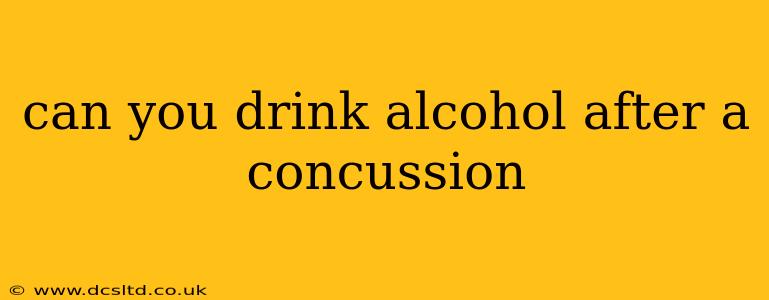Experiencing a concussion can be a jarring and unsettling experience. The brain, a delicate organ, needs time to heal after sustaining a traumatic brain injury (TBI). One common question that arises during recovery is whether or not alcohol consumption is permissible. The simple answer is a resounding no. Drinking alcohol after a concussion is strongly discouraged and can significantly hinder the healing process, potentially leading to serious complications.
This article will delve into the reasons why alcohol and concussion recovery are a dangerous mix, answering common questions surrounding this crucial aspect of recovery.
Why Should You Avoid Alcohol After a Concussion?
Alcohol acts as a central nervous system depressant. This means it slows down brain activity. After a concussion, your brain is already struggling to function optimally due to the trauma. Adding alcohol to the mix further impairs brain function, potentially exacerbating symptoms and prolonging recovery time.
Here's how alcohol negatively impacts concussion recovery:
-
Increased Inflammation: Alcohol can increase inflammation in the brain, hindering the natural healing process. This inflammation can worsen existing symptoms and lead to prolonged cognitive dysfunction.
-
Impaired Cognitive Function: Even moderate alcohol consumption can impair cognitive functions like memory, concentration, and decision-making, all of which are already affected after a concussion. This can make it even harder to manage daily activities and participate in therapy.
-
Sleep Disturbances: Alcohol can disrupt sleep patterns, even if it initially seems to induce sleep. Poor sleep is detrimental to concussion recovery, as sleep is crucial for brain repair and healing.
-
Increased Risk of Seizures: In some cases, alcohol can increase the risk of seizures, a serious complication that can occur after a concussion.
-
Delayed Recovery: Alcohol use significantly slows down the recovery process, potentially leading to longer-term cognitive and physical impairments.
-
Interaction with Medications: If you're taking prescribed medications for your concussion, alcohol can interact negatively, potentially causing harmful side effects or reducing the effectiveness of the medication.
What are the Symptoms of a Concussion?
Recognizing the symptoms of a concussion is crucial for seeking appropriate medical attention and avoiding alcohol. Common concussion symptoms include:
- Headache
- Dizziness
- Nausea and vomiting
- Sensitivity to light and sound
- Blurred vision
- Balance problems
- Confusion
- Memory problems
- Sleep disturbances
- Fatigue
- Irritability
How Long Should You Avoid Alcohol After a Concussion?
There's no set timeframe for when you can resume alcohol consumption after a concussion. It depends on the severity of the injury and the individual's recovery progress. It's always best to consult with your doctor or other healthcare professional before resuming alcohol consumption. They can assess your specific situation and provide guidance based on your individual needs. They might recommend abstaining from alcohol for several weeks, months, or even longer.
What Happens if I Drink Alcohol After a Concussion?
Drinking alcohol after a concussion could worsen your symptoms, prolong your recovery, and potentially lead to serious complications. The effects can vary depending on the severity of the concussion and the amount of alcohol consumed. You might experience increased headache, dizziness, nausea, confusion, and other symptoms. In severe cases, it could lead to seizures or other serious neurological complications.
Can I Drink Alcohol During the Concussion Recovery Process?
No, you absolutely should not drink alcohol during the concussion recovery process. As previously mentioned, alcohol is a central nervous system depressant that can hinder the healing process and exacerbate symptoms.
Is it Safe to Drink Alcohol After a Mild Concussion?
Even a mild concussion can cause brain damage that requires time to heal. Alcohol should be avoided completely until you have fully recovered and received clearance from your doctor.
In conclusion, avoiding alcohol after a concussion is paramount for optimal recovery. Prioritizing your brain's healing process by abstaining from alcohol will significantly improve your chances of a full and speedy recovery. Always consult with your healthcare provider for personalized advice and guidance.
